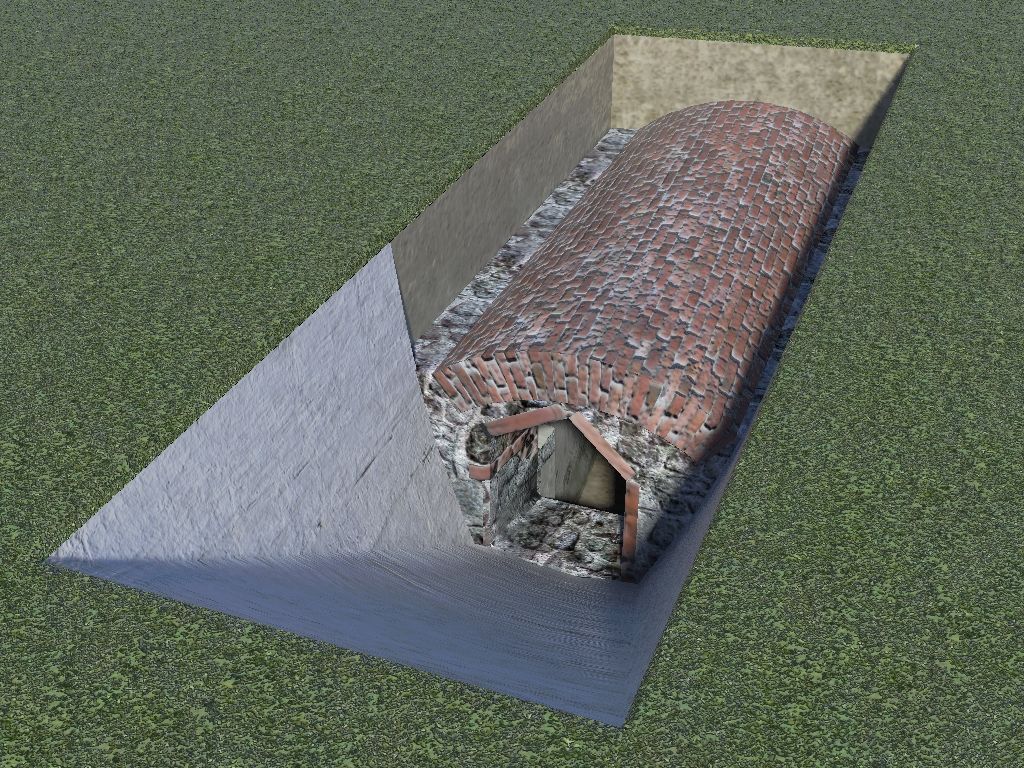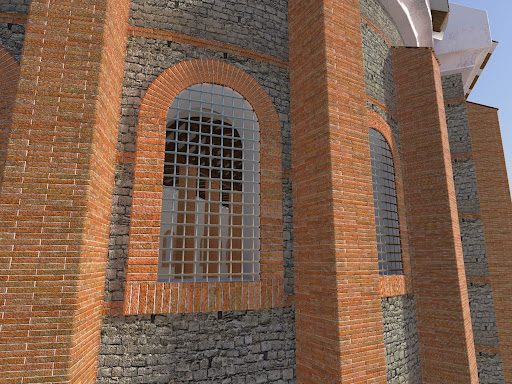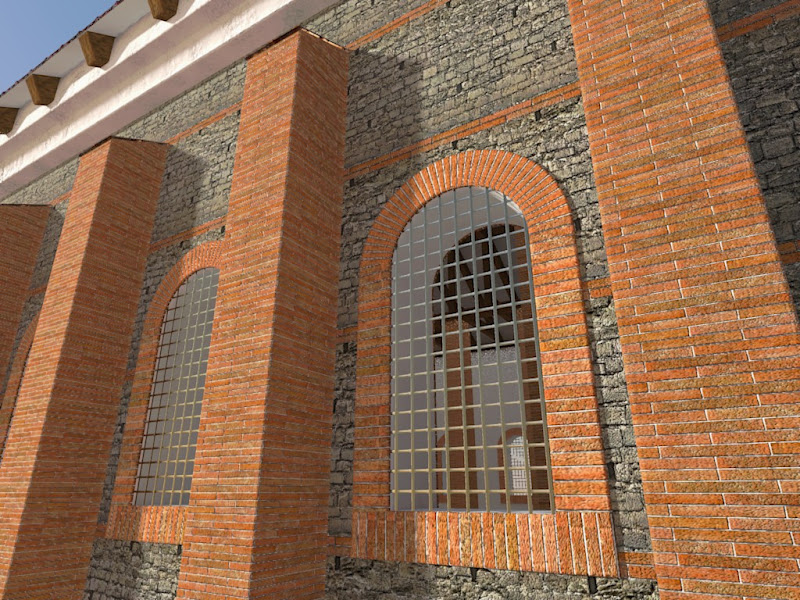Using materials and components for newbies
-
Hi
I've been using the free version of SU 7.1 for about a month. It's fun and I find myself learning (and wanting to learn) about architecture and construction techniques and materials used, mostly Roman - hence the moniker but I have a few questions:
but I have a few questions:Can a material with a texture be used (say) to paint the stones of an arch? All the materials I've seen have been regular and either horizontally or vertically aligned? Great for walls, but not arches.
At the moment I've been doing it by using actual stones placed in a semicircle by an array which is great, but I only did it this way because painting didn't work.On the subject of materials, if I try to get more for 7.1 it says "coming soon". Does anyone know when this is likely to be? Is it possible to use version 6 materials with 7.1 (pardon if this is a silly question)
On components. Do people create components out of components? - example:
I made a hinge component then a pivot component then a door component.
Then I put them together to make a "pivot and hinge assembly" component, then two pivot & hinge assemblies on the door to make a "door assembly" component.
Is this the right way to go about doing things?
Also if I make a change to say the pivot component how can I "cascade" the change through to the door assembly automatically?Thanks
-
Hi Vitruvius,
Some fine things for you in this topic.
As for arches - they are actually possible - though some manual workaround can never be spared. Here is one that I am working on ATM

Here is one I should still be working on (but am letting it settle down a bit) - a Late Roman basilica

And here is how I modelled the arch.
Where are you from England if it is not too personal? I used to have some joint project with the Batch Museum.
Edit - yes, you can use SU 6 textures with SU 7. But really, those textures are not the best - and you will hardly find anything for your kind of projects. Have a look at this topic however where Fritzi shared 2Gb of excellent materials and generally speaking, the "Components Materials and Styles" forum where lots of good textures and especially texture sources are shared.
-
Hi Gui, Nice models. I noticed that the iron grill is very close to the face of the brick. How was it held in place? Is there a functional reason for that location? Was the exterior finish heavly textured when first built, or more refined? I assume that the interior surfaces were veneered. No glass? How was the interior protected? Sorry for the questions, but I was intrigued.
-
Hey, Gaieus, what about the rest of Vitruvius' questions?
quoting:
"On components. Do people create components out of components? - example:
I made a hinge component then a pivot component then a door component.
Then I put them together to make a "pivot and hinge assembly" component, then two pivot & hinge assemblies on the door to make a "door assembly" component.
Is this the right way to go about doing things?
Also if I make a change to say the pivot component how can I "cascade" the change through to the door assembly automatically?" -
honolulu - you are right - the grill should be moved inside a bit. Not a biggie as it is just a simple face painted with that grill material.
Glass? No way. On such big windows at Roman times? Maybe when it was heavily raining or very windy, they protected the interior with some wooden shutters but we know nothing about this.The interior was roughly plastered as you can have a peek (only how I imagine it of course) here.
Mitcorb;
True, I somehow left those out. But why don't you answer them?

Anyway, certainly components can be made "nested" - parent components containing child components or even grandchild components - this should be a logical and useful limit however. The above windows are actually made like this, too - I reused the outside, arched frame in the inside, too (well, of course I could not do this with the apse windows as the outside is curving differently than the inside).
Apparently SU can have some problems with very deeply nested components, too, as though they help you keep file size down, for some reason, they may slow performance down. So there must be a healthy balance made...
-
Sigh......."A"rchitecture, don't get many chances to do stuff like that:-) Thanks for the interior.
-
Thanks for your helpful replies, Gaius and others.
I'm a beginner not only in SU but in Roman buildings too and have no training or special knowledge, I live just outside London. I'm afraid I don't know what the Batch Museum is, did you mean Bath Museum?
I tried to follow how you modelled the arch but I can't see any way to run the plug-in. There is nothing on the menu and I can't see any instructions either, yet you all seem to be able to do it. Can you point me at some instructions on how to run plug-ins, please.
I have the free version if that makes any difference)Meanwhile I looked at the other threads. The Tiled roof is great, thanks and will really help. I'll probably go and photograph some bricks and mortar and have a go at my own textures as well, I knew that pile of old rubble in my garden would come in useful one day.

Your Basilica is very impressive. I wasn't going to attempt any monumental buildings and the ones I'm currently interested are mostly single-story utility buildings such as storehouses, barracks, farm buildings, granaries etc suited to a Romano-British settlement or frontier town. I think only some buildings would have arches, and many would have rectangular openings. I think most walls would be stuccoed, even stone ones and some would be timber-framed, wattle and daub and some roofs might be thatched.
This reconstruction is about as monumental as I wanted to go, but I suspect it has some modern techniques in it. You might find it interesting for its own sake
http://www.gallica.co.uk/villa/photos_high.htmIf I come up with anything worthy, I'll post it.
-
Hi Vitruvius,
Sorry, of course I meant the Bath Museum.
 Here is the website we made collectively:
Here is the website we made collectively:
http://www.h2g2.hu/peregrinus/Certainly smaller, provincial buildings are interesting, too - but don't forget that the Bath baths are in the provinces (as well as "my" basilica) so you never know. Here is an image of a friend's Roman fort he build for kids (exported into some game engine for our regular, yearly re-enactment camp where they have sessions to learn about Roman life)

Obviously most of those buildings are also those "regular, provincial" type (however military constructions are different).
Anyway, cool endeavour so keep us poseted both with your questions and your results!
That site you linked seems very interesting, thanks!
BTW this is our World Heritage site - a Late Roman / Early Christian cemetery now obviously underground. I still need to reconstruct these (I am currently "bidding" with the local Heritage Trust as they are applying for considerable EU funds)

[flash=610,480:1p82gjdh]http://www.youtube.com/v/UNzVpzpi0EA&hl=en_US&fs=1&[/flash:1p82gjdh]
-
@vitruvius said:
...but I can't see any way to run the plug-in. There is nothing on the menu and I can't see any instructions either, yet you all seem to be able to do it. Can you point me at some instructions on how to run plug-ins, please.
Just in case anyone answers, I solved this:
For some reason the menu heading "plug-in" does not appear on the menu with the plug-ins that came with the download. It suddenly appeared when I saved the UV toolkit though -
Oh sh...t sorry, I totally forgot that question.

Advertisement







